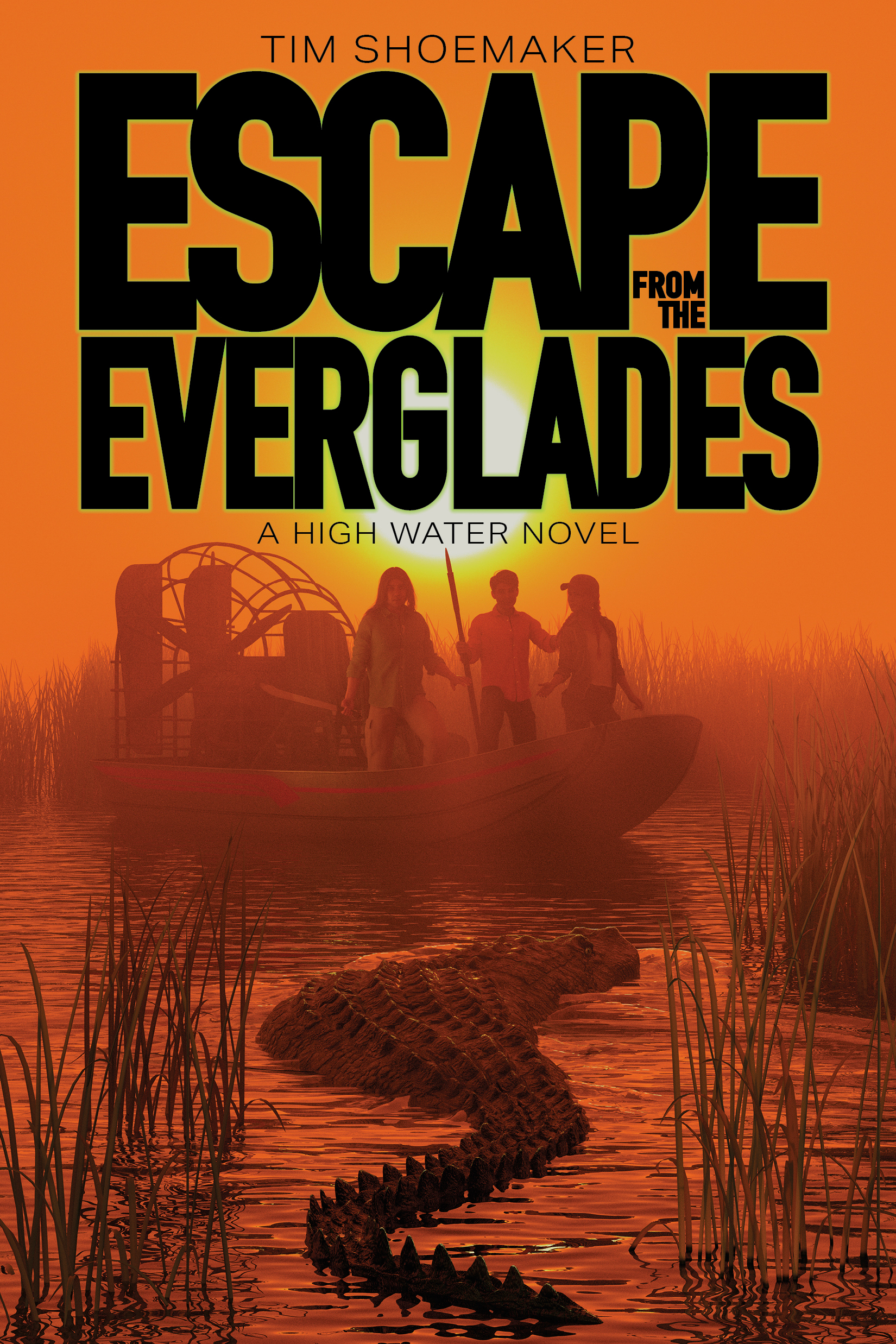“Exposing our kids to more darkness is not helping them navigate the path of life.”
By Tim Shoemaker, author of the book Escape from the Everglades
“You can’t have it all.” How many times have we heard that? Sometimes we think the same you-can’t-have-it-all principle applies to YA fiction.
You can’t write clean YA and that holds a reader’s attention.
You can’t write clean YA fiction that feels believable.
You can’t write clean YA fiction that’s not hokey.
But is that really true? I’ve never gotten a letter from a reader who thought my writing would be better if it wasn’t so clean. But I often hear from readers and parents hunting for more novels that are clean. And for good reason.
Our World Harbors a Dark Agenda
The world is intoxicated with money, power, and very different values. The world often seeks to influence our kids—to further its agenda or for some personal gain. The world often tells our kids that what we as parents define as good is actually bad. And the things we’ve taught our kids to consider bad, the world claims are good. There is no more effective way for the world to get those messages across than through the arts: books, movies, music.

Photo credit: Tran Nguyen
The Secret: Why Fiction Is so Incredibly Powerful
When we hear a lecture, a sermon, or read a nonfiction book, we tend to process the information in our brains. The parts we really embrace travel from the head to the heart. Those things that make it to our heart drive us and influence our actions.
That’s why we need to guard our heart. What’s down in the well comes up in the bucket, right?
Now, when we read fiction, listen to an audio novel, or watch a movie, we process that differently than a lecture or nonfiction. If the story and the characters resonate and connect with us, that fiction enters directly into the heart rather than the head.
Did you catch that? Nonfiction must work its way through our rational brain—and maybe some goes to our heart and lodges there. But great stories are absorbed into our heart the moment they grab us. Skillfully written fiction doesn’t have to make the journey from the head to the heart. It’s already there.
The heart is where the power is. The heart influences so many of our decisions. So a fictional character who makes bad choices without realistic consequences can easily influence a YA reader to move in the same direction. Our kids can be quick to buy the lies. We really, really need clean fiction for our YA readers.

Photo credit: Fabiola Peñalba
You Can’t Fight Darkness with More Darkness
Embedded into the very spine of many YA books are some pretty dark themes—all in the name of being more real. Traditional values are subtly discounted. Living by feelings instead of by faith is quietly affirmed as the way to go. Exposing our kids to more darkness is not helping them navigate the path of life. Fiction’s influence on our kids is incalculable. When a writer successfully builds a character that YA readers like, then whatever belief system drives that character can also effectively move the moral compass guiding the reader.
Public school librarians have taken me aside, confessing the need for clean YA fiction. “Coming of age” novels sound harmless enough. But recently more and more stories include sexual awakenings or elements that most of us wouldn’t want our kids exposed to. “Books are marketed as first love,” one middle school librarian explained. “But it’s really first sex—about kids having sexual encounters like it was the most normal thing in the world.” The readers are glued to the page, and their raging hormones are stoked. This kind of writing chips away at the morals our kids were raised with.
If You Really Want to Help a YA…Don’t Just Offer Them a Hand. Give Them a Light.
Young readers need excellent writing that shows how to avoid traps that can tear them down—or cripple them for life. People gain wisdom through experience, but that experience doesn’t have to be personal. Seeing the choices fictional characters make—and the lessons they learn—works like a light, bringing wisdom to our readers that helps them make better decisions.

Photo credit: Noorulaabdeen Ahmad
Some Say We Need Sex in Our Novels if We Want YA Readers.
That’s baloney. Adding a sex scene to show two people really love each other is lazy writing. I don’t have to tell you about my sex life with my wife to convince you that we love each other. How we feel about each other should be obvious through the way we treat each other. The same principle applies to writing. A skilled writer can show how two people feel about each other without relying on sex to convey that thought.
Some Say We Need “Language” to Make the Writing Realistic. Not True.
According to Ephesians 4:29, no Christian writers should have “coarse language” as a tool in our toolbelt. Honestly, we totally don’t need it. Not even for “bad” characters. I fully believe we can write excellent, clean fiction. With God’s help we can out-write other authors who need the crutches of language or sex to make their books more exciting.
YA Readers Need Truth.
The world is not telling our kids the truth—about right and wrong, about consequences for the choices they make, about life. Great writing brings truth to readers. Deep. Ancient. Truth.

Photo credit: Matias North
YA Readers Need Hope.
An author’s best writing comes from the heart. That’s true of a Christian or a secular author. This explains why so many secular novels lack a fully satisfying ending. The story often lacks real hope—because in the deepest places of that author’s heart they don’t possess any eternal hope themselves. That reality can’t help but come out on the page. In this world of increasingly depressed kids, that is exactly what we don’t need.
Christian authors have the edge there . . . but they need to stop mimicking secular authors. They need to showcase a realistic hope in Crist that other authors can’t.
Fiction Can Be Clean–Believable, Non-Hokey, and Absolutely Riveting to Readers.
I love writing mystery, adventure, and suspense. Here are some of my personal guidelines for writing:
Write about ordinary characters who get in over their head somehow.
Show characters making bad choices—and the resulting consequences.
Let characters figure out their mistakes in the end—and fess up to parents.
Don’t make parents look like idiots—because they aren’t.
Write clean in every sense of the word.
Make the story believable—and avoid all agenda-driven, hokey fiction elements.
Write to bring truth.
Write to bring hope.
Write to give readers experience—which leads to wisdom and better decisions.
Readers are smart . . . so don’t write down to them.
I pray and pray and pray as I write. I ask for the Holy Spirit’s power to be infused into the book. His truth. His insights. He’s the creative one . . . and He can help us outwrite authors who write from a secular worldview.

Photo credit: Kelly Sikkema (@kellysikkema)
One of My Favorite Letters from a Reader Last Year Said This: “I just finished the book. It was my favorite book in the whole world. I feel so happy that I might throw up.”
That definitely made me smile. It confirmed that we can write great stories that are loved by middle grade and YA readers—all while keeping our fiction clean. I guess we really can have it all.
Featured image photo credit: Amir Hosseini
You might be interested in
Escape from the Everglades by Tim Shoemaker
Escape from the Everglades is the first book in the High Water series and blends contemporary mystery and suspense, dramatic situations, and high adventure that both boys and girls will love.
A park ranger’s son hates the Everglades, and he thinks he’ll just die if he doesn’t escape southern Florida soon . . . and he’s right. After Parker Buckman is mauled and nearly killed by an alligator, he sees the Glades as a place of death. All he wants to do is get out of the area, and he’s convinced he won’t truly be okay until he does. But he can’t leave until he finds a friend who goes missing.
Escaping a bad situation isn’t a matter of a geographical change. Sometimes the best way to a brighter future is to face the darkness of your past.
About the Author
Tim Shoemaker is the award-winning author of the Code of Silence series and a popular speaker—especially for school assemblies. When he isn’t on the speaking and teaching circuit, he’s busy working with kids and writing more great stories! He’s the author of eleven books, including Super Husband; Super Dad; Code of Silence; Back Before Dark; Below the Surface; Smashed Tomatoes, Bottle Rockets . . . and Other Outdoor Devotionals You Can Do with Your Kids; Dangerous Devotions for Guys; and more. He speaks for schools, churches, and parachurch organizations (such as Focus on the Family, Iron Sharpens Iron men’s conferences, International Network of Children’s Ministry, and the Moody Pastors’ Conference). He also speaks at men’s retreats, women’s gatherings, couples’ retreats, youth worker conventions, homeschool conventions, and writers’ conventions, and he conducts family devotion workshops all across the country.





